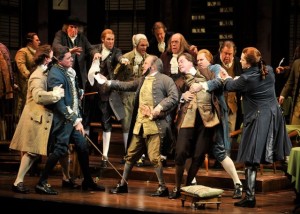![]() by Naomi Siegel
by Naomi Siegel
view review on NYTimes.com
 The Congress is in obstructionist mode. Conservatives and liberals lock horns. Debates about taxes, an escalating war, the erosion of human liberties and a restructuring of the social order end in stalemate and standoff.
The Congress is in obstructionist mode. Conservatives and liberals lock horns. Debates about taxes, an escalating war, the erosion of human liberties and a restructuring of the social order end in stalemate and standoff.
“Piddle, twiddle and resolve; nothing ever do we solve,” is the way one wag describes the morass.
The legislative body in question is the Second Continental Congress, and the play is “1776,” the 1969 Tony Award-winning musical by Sherman Edwards (music and lyrics) and Peter Stone (book) that recounts the critical final weeks leading to the signing of the Declaration of Independence. It is currently receiving a rousing, colorfully acted and musically rich revival at Paper Mill Playhouse.
Forty years after the show took Broadway by storm, “1776” remains a powerful teaching tool; a 1972 film version is a basic part of the curriculum for legions of American History 101 students. The founding fathers emerge with striking individuality and depth, among them John Adams (said to be “obnoxious and disliked” even by admirers among his colleagues); Benjamin Franklin (spouting witticisms as he perpetually nods off in public); and Thomas Jefferson (a rather effete personality, though lusty in his appreciation for his young wife, Martha). The excruciating contortions that the Congress undergoes before it can muster a unanimous vote for independence — the Tory sympathizer John Dickinson of Pennsylvania insists on unanimity — are vividly brought to life.
That said, “1776” can prove heavy going. Its first act of one hour and 45 minutes contains ponderous stretches of dialogue punctuated by widely spaced musical numbers (several of which are more fillers than plot movers). The second act, shorter and with greater dramatic tension as the vote on the Declaration nears, is less problematic.
A large and talented cast is ably directed by Gordon Greenberg. Don Stephenson as John Adams captures perfectly the unflagging badger we know so well from historical records. A tender exchange of letters with Abigail, played beautifully by Kerry O’Malley, lowers the level of bombast in a welcome shift. As Benjamin Franklin, Conrad John Schuck gives a warm and humorous portrayal. If Kevin Earley’s Jefferson seems a bit flaccid, the excessively bouncy Martha of Lauren Kennedy, especially in her morning-after romp “He Plays the Violin,” strikes one as too contemporary in style and sound.
Aaron Ramey as Richard Henry Lee mugs outrageously as he lavishes praise on “The Lees of Old Virginia,” while Nick Wyman finds measured dignity in the venerable John Hancock. With Robert Cuccioli’s deliciously suave portrayal of John Dickinson, the audience has someone they love to hate. Mr. Cuccioli’s demeaning sneers and scornful shrugs find their mark.
In a score that lacks distinction, James Barbour’s performance of “Molasses to Rum,” with its lurid description of the trade triangle involving slavery, and Griffin Matthews’s “Momma, Look Sharp,” a dirge sung by a mortally wounded soldier, are standouts.
The single-setting scenic design of Kevin Rupnik, lighted elegantly by Jeff Croiter, works beautifully to evoke the Philadelphia environs of the Congress, and Alejo Vietti’s costumes are period perfect.
All in all, this is a meaty musical history lesson with contemporary resonance, performed with panache.

Comments are closed.